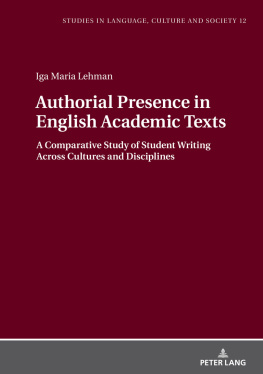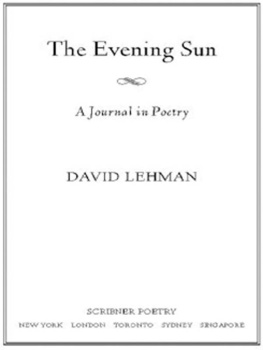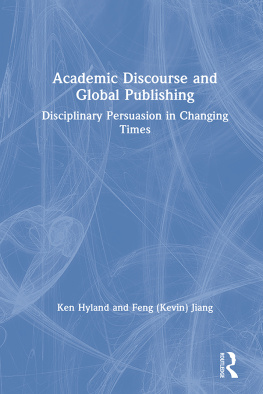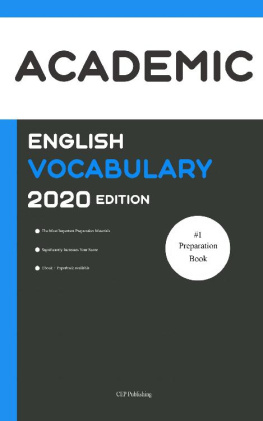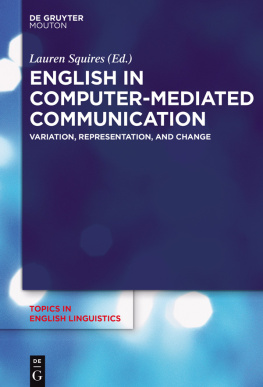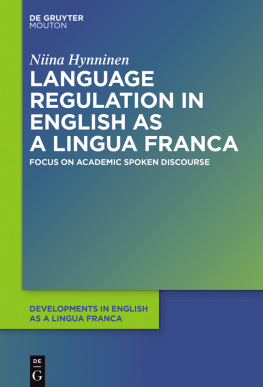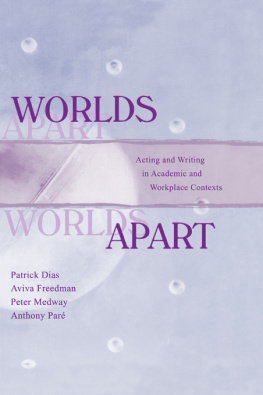Contents
Page List
STUDIES IN LANGUAGE, CULTURE AND SOCIETY
Edited by ucja Biel, Andrzej Ktny and Piotr Ruszkiewicz
VOLUME 12
Iga Maria Lehman
Authorial Presence
in English Academic Texts
A Comparative Study of Student Writing
Across Cultures and Disciplines
Bibliographic Information published by the Deutsche Nationalbibliothek
The Deutsche Nationalbibliothek lists this publication in the Deutsche Nationalbibliografie; detailed bibliographic data is available in the internet at http://dnb.d-nb.de.
Library of Congress Cataloging-in-Publication Data
A CIP catalog record for this book has been applied for at the Library of Congress.
This publication was financially supported by the University of Social Sciences, Poland.
ISSN 2195-7479
ISBN 978-3-631-74940-1 (Print)
E-ISBN 978-3-631-75712-3 (E-PDF)
E-ISBN 978-3-631-75713-0 (EPUB)
E-ISBN 978-3-631-75714-7 (MOBI)
DOI 10.3726/b14175
Peter Lang GmbH
Internationaler Verlag der Wissenschaften
Berlin 2018
All rights reserved.
Peter Lang Berlin Bern Bruxelles New York Oxford Warszawa Wien
All parts of this publication are protected by copyright. Any utilisation outside the strict limits of the copyright law, without the permission of the publisher, is forbidden and liable to prosecution. This applies in particular to reproductions, translations, microfilming, and storage and processing in electronic retrieval systems.
This publication has been peer reviewed.
www.peterlang.com
About the author(s)/editor(s)
Iga Maria Lehman is Assistant Professor at the Institute of English Studies at the University of Social Sciences in Warsaw, specializing in academic discourse analysis, identity and cultural studies. She has a wide experience of teaching in culturally diverse academic settings.
About the book
This book presents a case study of student-writers from multiple cultural and academic backgrounds. It investigates how writing, as an act of identity, can be analyzed along an axis of individual and social influences. This continuum entails a number of related perspectives, including the ways in which individuals reproduce or challenge dominant literary practices and discourses, and how they occupy the subject positions made available in their discourse communities. The analysis of the findings draws on selected socio-semiotic and more broadly, anthropological views of language, which are then synthesized into a multi-aspect model of academic writer identity.
This eBook can be cited
This edition of the eBook can be cited. To enable this we have marked the start and end of a page. In cases where a word straddles a page break, the marker is placed inside the word at exactly the same position as in the physical book. This means that occasionally a word might be bifurcated by this marker.
| 5
For my Mother
| 11
I would like to express my special gratitude to Professor Robin Anderson for his valuable insights which advanced the progress of this book, his unshakable confidence in me and his great sense of humor in the trying times of its completion.
I am extremely grateful to my dear friend, Dr. Iwona Nowakowska, for her critical and thought-provoking comments on the quantitative part of my study. My thanks also to Dr. Laura Gago for her help with collecting the writing sample corpus.
My sincere thanks are extended to Professor Franciszek Grucza who not only inspired my research interests, but also gave me constant encouragement to produce this book.
I am indebted to Professor Hanna Komorowska, Professor Jo Lewkowicz and Professor Maria Dakowska whose advice enriched this work and me as a researcher.
For their enormous help in organizing the rating sessions I would like to thank my colleagues, Dr. Anna Wiechecka and Dr. Kinga Rudnicka-Szozda.
I am particularly grateful to the students from the Department of English Philology at the University of Social Sciences in Warsaw, the students from the Department of English Studies: Language and Literature at the University of Salamanca and the students from the Departments of Management, Economics and Finance and Accounting at Kozminski University and Vistula University in Warsaw who agreed to participate in this research project.
Most of all, special thanks go to my children, Alexandra, Robert and Jakub for their tolerance, support and understanding that allowed me to keep working on this book.
| 13
The British complained increasingly that the Pakistanis wouldnt assimilate. This meant they wanted the Pakistanis to be exactly like them. But, of course, even then they would have rejected them. The British were doing the assimilating: they assimilated Pakistanis to their own view []. I withdrew, from the park, from the lads, to a safer place, within myself. I moved into what I call my temporary period []. In this isolation, in my bedroom where I listened to The Pink Floyd, The Beatles and the John Peel show, I started to write []. This I call keeping the accounts (Kureishi 2011).
I begin this book with an excerpt from Kureishis life story because it offers an interesting insight into what type of socialization processes may occur when an individual attempts to live with socio-cultural differences and to develop her/his authorial voice while dealing with certain challenging aspects of the new language and culture. Kureishis autobiographical essay explores the experience of being a young Pakistani growing up in the United Kingdom, through themes of race and class, but in particular, through the description of his quest for his own voice as a writer. In the drafting of the story, his authorial self moves from the third person singular to the final version in which Hanif is repeatedly crossed out and the first-person narrator emerges. Kureishi reveals that he initially used the third person narrative voice because of the difficulty of directly addressing myself to what I felt then, of not wanting to think about it again (Kureishi 2011, p. 31). His attempt to impose order and unity on the dislocated and fragmented aspects of his life was achieved through his struggle and negotiation to construct his authorial self. Kureishis desire for a unified identity has certain affinity to Giddens notion of ontological security which states that humans strive for mental coherence and wholeness, and that this entails a process of ordering chaotic and anxious elements of our environment (Giddens 1991).
0.1 Socio-cultural and institutional influences on identity formation
How people present themselves as authors and how their possibilities for self-expression are supported and/or limited by the socio-cultural and institutional context in which they write, have been the subject of considerable research in a wide range of academic fields. However, the key literature produced on this topic has failed to give sufficient consideration to such issues as feelings of alienation, 13 | 14 inadequacy and exclusion, as experienced by non-native writers as they strive to align themselves with the dominant narrative styles of their adopted culture.
The opportunity and ability to collect, order and narrate our personal experiences can contribute to the formation of a sense of identity. However, what defines people as credible writers is not only the content of their stories, but the way they draw on the shared, socially available resources they use to tell them. For Gee, these shared experiences are used as follows, when we speak or write we always take a particular perspective on what is normal and not; what is acceptable and not, what is right and not, what is real and not; what is the way things are and not; what is the way things ought to be and not; what is possible and not; what people like us or people like them do and dont; and so on and so forth, again through a nearly endless list (1999, p. 2). A writer voice then is created by the authors negotiation, acceptance, modification and rejection of the societal norms which surround her or him.

